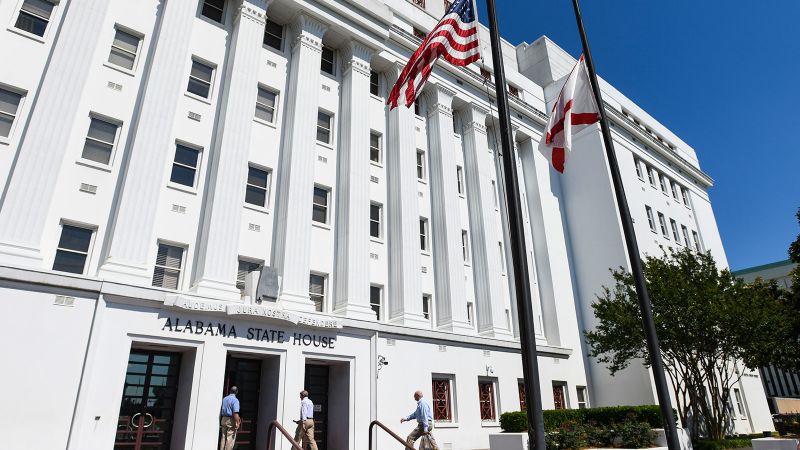CNN
—
A fight over congressional representation in Alabama is headed for another federal court showdown after the state’s Republican-controlled legislature approved new district lines that critics say openly defy a US Supreme Court mandate to give Black voters more power in this Deep South state.
The high-stakes battle – slated to play out before a federal court next month – could help shape whether Republicans retain their narrow majority in the US House after the 2024 election. And it could again force courts to consider whether and how the landmark 1965 Voting Rights Act should apply in redistricting cases.
On Friday, the Republican-dominated legislature approved new maps, just weeks after the US Supreme Court said that an existing map – with just one majority-Black congressional district out of seven in a state where Black residents make up 27% of the population – likely violated the decades-old federal voting law by diluting the voting power of Black residents.
The high court, by a 5-4 majority, affirmed a lower court decision that had ordered the state to redraw the congressional maps to include a second majority-Black district or “something quite close to it.”
But the map approved Friday – and signed into law that day by GOP Gov. Kay Ivey – instead boosted the share of Black voters in the majority-White 2nd Congressional District from roughly 30% to around 40%. It also reduced the Black voting-age population in the state’s only majority-Black district to around 50% from about 55%.
The new map also guarantees that no incumbents will face off in a primary election in 2024.
“The Legislature knows our state, our people and our districts better than the federal courts or activist groups,” Ivey said in a statement that praised lawmakers for producing the new maps before a court-ordered deadline.
But civil rights advocates saw a familiar, if discouraging, pattern. “I’m both disappointed but not surprised,” Stuart Naifeh – manager of the redistricting project at the Legal Defense Fund, a civil rights group that represents some of the plaintiffs in the original case – told CNN. “Alabama has been discriminating against Black voters for literally more than a century. … It’s kind of more of the same.”
State Rep. Chris England, an African American Democrat who represents Tuscaloosa, said the Republican legislature’s GOP supermajority is “openly and intentionally defying” the court’s instructions, and it now will fall to federal judges to take corrective action.
“This is not an unfamiliar feeling for us,” England said. “Throughout our history, the federal courts have always had to force Alabama to do the right thing.”
Alabama history during the civil rights era is littered with examples of state officials resisting mandates from the federal government. Former Attorney General Eric Holder, who leads a Democratic redistricting group, pointedly evoked that segregationist history in a statement that said the map, “and the Republican politicians who supported it, would make George Wallace proud.”
The sole majority-Black congressional district in the state, now represented by Democratic Rep. Terri Sewell, was created following a court order in the early 1990s.
The litigants in this case face a tight timeline.
The plaintiffs have until Friday to object to the new map in federal court, with a hearing expected on August 14. Naifeh said his clients intend to lodge objections to the map.
State officials previously have said the final map must be in place by early October to give candidates and election administrators time to prepare for March primary elections. The three-judge federal panel overseeing the case could choose to implement a new map with two majority-Black districts drawn by an expert it appoints. This week, it asked the parties to submit the names of three to five outside mapmakers by Friday after a previous redistricting expert withdrew from the case.
The state, in turn, still could appeal a map drawn with the court’s approval, setting off another round of litigation.
In a statement, a spokesperson for Alabama Attorney General Steve Marshall, a Republican, said the legislature has devised a “fair map” that complies with the Voting Rights Act and argued that it applies traditional redistricting principles, previously upheld by the US Supreme Court.
And Republicans in the legislature say the new map made appropriate adjustments to comply with the high court’s ruling, arguing that it keeps together so-called communities of interest with similar economic and geographic profiles and priorities. They argue that the new map still provides an opportunity for Black voters to elect a candidate of their choice.
“I firmly believe that the map we adopted … is a fair solution that positions Alabama’s congressional districts and our voters in the best way possible,” Alabama Senate President Pro Tempore Greg Reed said in a statement.
Kareem Crayton, a redistricting expert and Alabama native who is senior director for voting and representation at the liberal-leaning Brennan Center for Justice, disagrees.
The state has a history of racially polarized voting, making it harder for candidates favored by Black voters to win in a district where they account for less than 50% of the voting-age population, Crayton said. And the center’s data show that voters in the 2nd District – as reconfigured by the state legislature last week – would have backed the Democratic candidate preferred by Black voters in just one of the 15 recent elections: the 2017 US Senate race won by Democrat Doug Jones. (Jones scored an upset in this deep-red state in a special election after his Republican rival faced allegations of child molestation and sexual assault.)
“This isn’t even close to what a district that provides equal opportunity would produce,” Crayton told CNN. “The effort that they (legislators) offered is a rather weak one.”
The fight over the maps has sparked national attention, given the razor-thin majority that Republicans hold in the US House of Representatives. The Alabama case – along with the outcome of other redistricting battles looming around the country, including in North Carolina, Ohio, Georgia, Louisiana, New York and Texas – could help decide partisan control of Congress in 2025.
In Alabama, most Black voters have supported Democrats. If federal judges approve a map with a second majority-Black district, that could result in two Democrats representing the state in the US House.
In one sign of the high stakes: House Speaker Kevin McCarthy weighed in on the debate, telling reporters on Capitol Hill that he had spoken to a “few” Alabama lawmakers as they met for a special session last week to redraw the maps.
Alabama state Sen. Steve Livingston, a Republican who co-chairs a legislative committee charged with map-making, was more blunt about the objective, telling reporters that McCarthy had told him: “‘I’m interested in keeping my majority,’” according to the Alabama Reflector. Livingston did not respond to messages from CNN.
McCarthy aides did not respond to requests for comment this week.
There are signs that some Republicans in the state want the courts to further reexamine the application of the Voting Rights Act in these cases.
In a letter to lawmakers earlier this month, Marshall, the attorney general, argued that the Supreme Court’s recent decision ending affirmative action in college admissions means that using a map in “which race predominates” could open up the state to claims that is violating the 14th Amendment’s guarantee of equal protection. And he noted that one of the US Supreme Court justices who sided with the majority on the Alabama map – Justice Brett Kavanaugh – joined only partly in the 5-4 decision.
Alabama sits at the center of an earlier, successful challenge to a key pillar of the federal voting law.
In a 2013 redistricting case out of Shelby County, the US Supreme Court defanged a portion of the Voting Rights Act by tossing out a formula that had been used in requiring nine states and scores of local jurisdictions with a history of racial discrimination in voting to secure approval – or “pre-clearance” – from the US Department of Justice or a federal court before they could make changes to their voting procedures and laws.
Some Democrats in Alabama argue that the current skirmishes over the state’s congressional map – and the defiance of Republican legislators in the face of federal court decisions – are aimed at taking the issue to the high court again in the hopes of peeling away a conservative justice who sided with the majority in the most recent case.
“It feels like a process designed to force this thing back into court to take another shot at gutting the Voting Rights Act,” England, the Tuscaloosa Democrat, said of the legislature’s refusal to simply draw a second majority-Black district.
Voting rights activists believe they will prevail, at least in the short-term, in challenging the latest map advanced by Alabama Republicans, given that the case is before the same judges – all three appointed by Republican presidents – who rejected the initial map as discriminatory.
“Alabama may be trying to engineer another bite at the apple in front of the Supreme Court, but it is difficult to imagine the three-judge panel indulging such blatant noncompliance, or the Supreme Court suddenly reversing course in the face of the legislature defying their ruling from just a month ago,” Chris Shenton, a voting rights attorney at the Southern Coalition for Social Justice, said in a statement to CNN.
Sumber: www.cnn.com






